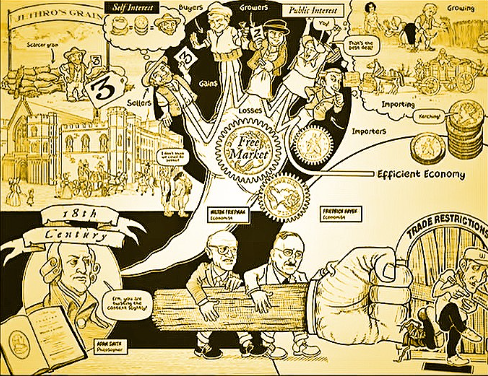INTRODUCTION
In this era of globalisation, capitalism has taken a toll on world markets and governments. It is essentially a form of market where businesses are owned and run by private individuals working for profits. There is very little to almost no state interference in regulating the market. Prices are determined by the capitalist forces of demand and supply.
With the rise in globalisation, there has been a rapid rise in the transnational and capital flow of finances and people. With liberalisation and gradual democratization of countries, world markets shifted to a ‘laissez-faire’ or free market economy. However, these giant firms upon entering the domestic economy thrashed the prospects of local businesses existing in the industry. With the onset of COVID-19, we further saw how ‘big firms’ thrived at the cost of local businesses and traders.
HOW CAPITALISM AFFECTS LOCAL BUSINESSES?

- PERFECT COMPETITION:
The big giants of the capitalist industry usually have a lot of resources including financial and social capital. They tend to have better infrastructure, more employees, better media and public relations, larger outreach, and more efficient customer services among other things. Similarly, they spend more on advertising their products expanding their outreach to the nooks and corners of the world. Local businesses, on the other hand, lack such a kind of social and financial capital. They lose in competition to MNCs over their dropping sales. They find it more challenging to compete with them and eventually shut down.
- DEMOGRAPHIC DIVERSIFICATION:
A recent trend that is a product of capitalism has been the diversification of products and services as per consumer behaviour. MNCs keep themselves at par with the changing needs of consumers. As the markets keep evolving, the needs of the consumers change accordingly. The consumer shifts to better products and more healthy alternatives. Private players who capitalise on lots of profit are able to keep up with the changing demands whereas local firms run out of business due to lack of finances.
- ADMINISTRATIVE BIAS:
With rapid polarization in modern democracies, present-day governments have become more involved in vote bank politics more than ever. The election rallies with pomp and show require a huge monetary investment. MNCs, on the other hand struggling with checks and permits are willing to pay as much as needed to ward off the control of vigilance.
The dubious relations between state and private players are often put under question. Politicians often join hands with capitalist players for the higher benefit of both parties. This marginalises small and local businesses as they continue to cope with the exploitative market structure.
Not just this but there have been numerous cases of local owners losing enormous legal battles to these big giants because they do not have the adequate resources to compete with them.
CULTURAL APPROPRIATION AND COMMODIFIED SOUTH-ASIAN CULTURE
South Asian culture is incredibly diverse and vibrant, encompassing a wide range of traditions, languages, religions, and artistic expressions. Unfortunately, capitalist businesses have repeatedly commodified various aspects of this culture without properly recognizing or compensating for its origins. Clothing, jewellery, henna, yoga, and spiritual practices like meditation have all been appropriated and commercialized, stripped of their cultural significance, and repackaged for profit.

- EXPLOITATIVE LABOUR PRACTICES:
Many large corporations exploit the labour of South Asian workers, particularly in the fashion and textile industries. These workers, often underpaid and subjected to poor working conditions, toil to produce the same items that are then marketed as exotic and trendy. The discrepancy between the profits reaped by corporations and the inadequate compensation provided to the workers highlights the stark inequality perpetuated by capitalism.
- RACIAL STEREOTYPES AND ORIENTALISM:
While big businesses capitalise on South Asian culture, they also perpetuate stereotypes and reinforce racist attitudes toward the region’s people. Media representations often depict South Asians in a limited and distorted manner, reinforcing Orientalist tropes of exoticism, backwardness, or religious fundamentalism. This not only distorts public perception but also perpetuates systemic discrimination against South Asian communities in various spheres of life.
- PROMOTING AUTHENTICITY AND FAIR TRADE:
Addressing exploitative practices and cultural appropriation requires a collective effort. Consumers can play a crucial role by supporting businesses that engage in fair trade, pay fair wages, and respect the cultural heritage of South Asia. By demanding authenticity and transparency, consumers can help ensure that businesses are held accountable for their practices and actively contribute to the well-being of the communities they draw inspiration from.
CONCLUSION
The paradox of big capitalist businesses profiting from South Asian culture while looking down on it is a stark reminder of the exploitative nature of capitalism. It is essential to recognize and challenge the systemic issues that perpetuate cultural appropriation, labour exploitation, and racial stereotypes. By fostering a more equitable and inclusive approach, we can move towards a future where cultural appreciation goes hand in hand with respect, fairness, and a genuine appreciation for the contributions of diverse cultures.
-Bhawini Srivastava and Liya Ann Mary
MUST READ: LGBTQ+ YOUTH: 5 FACTORS TO PROMOTE EQUALITY IN HEALTH FACILITIES


